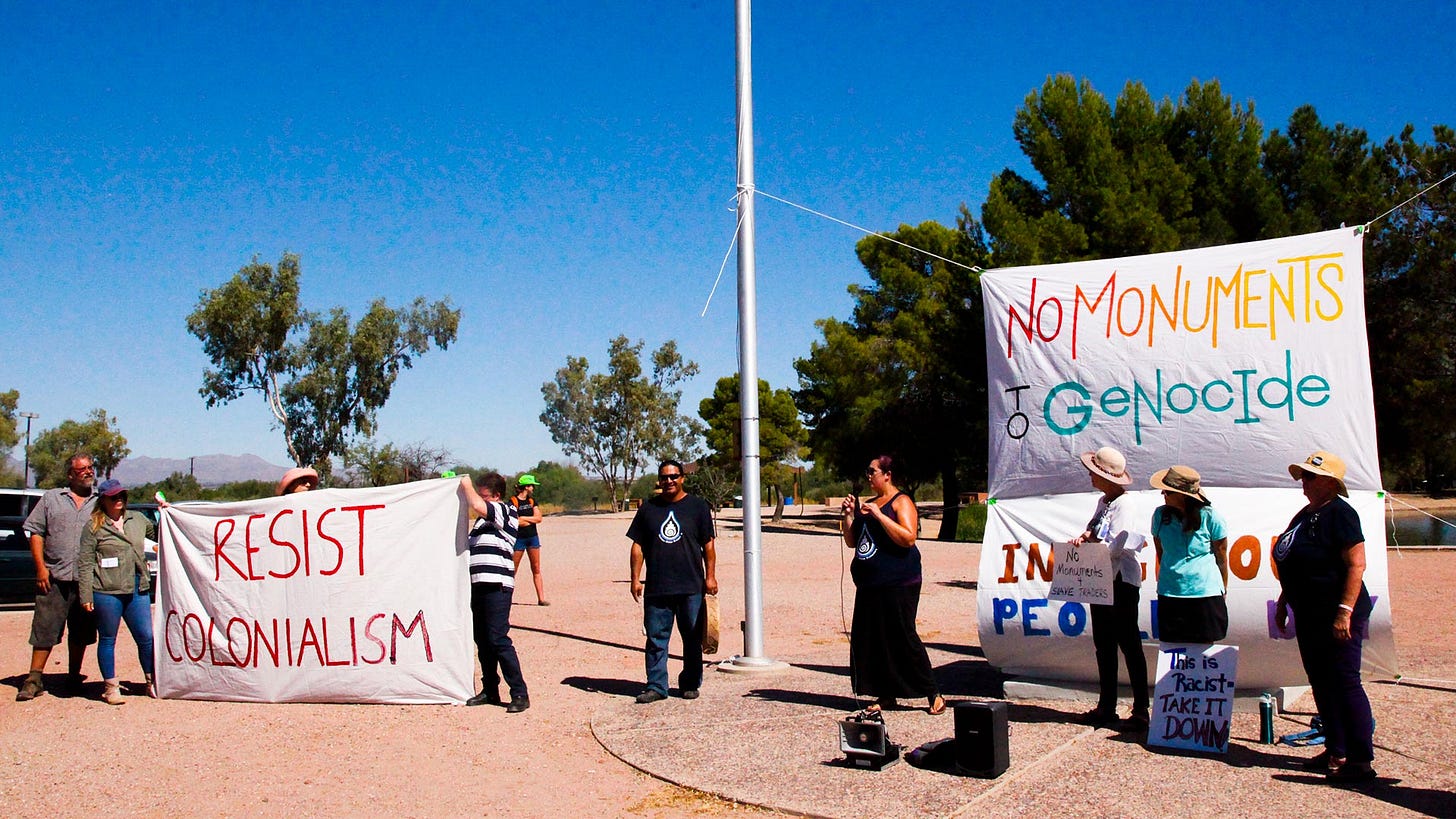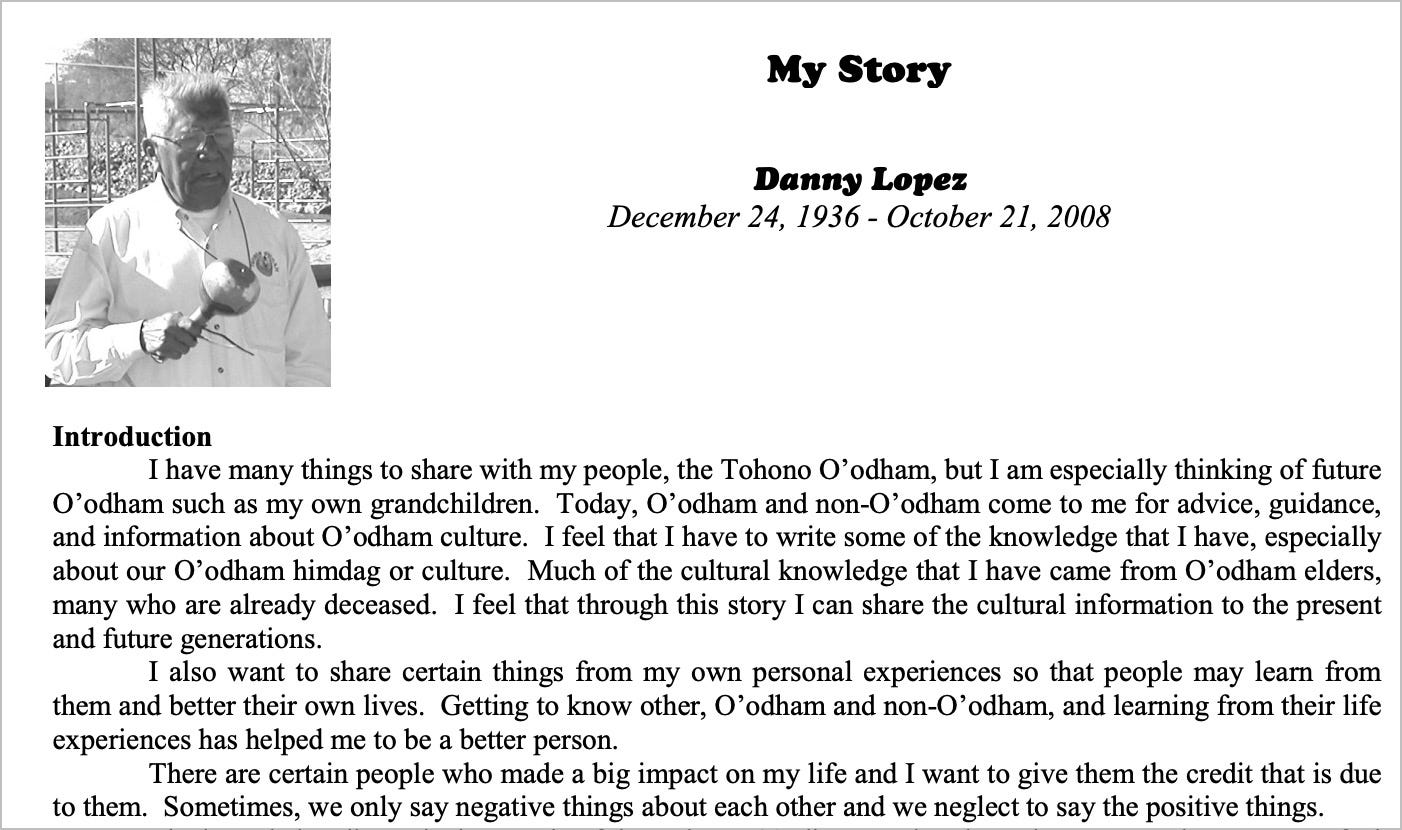🌵 Mondays with Morales: This Indigenous People's Day, Let's Rename Christopher Columbus Park 🏞️
10/14/24: 🧠 Meet Danny Lopez: Educator, Elder, and Community Hero

😽 Keepin’ It Simple Summary for Younger Readers
👧🏾✊🏾👦🏾
🏞️🦅 Tucson has a big park called Christopher Columbus Park, but many people think that's not a good name. They want to change it to Danny Lopez Park. Danny Lopez was a kind and wise teacher who helped lots of kids learn about Tohono O'odham culture. Changing the name would be a way to say "thank you" to Danny and show respect to all Native American people who lived here first. The city is asking everyone what they think about this idea. If you have an opinion, you can write a letter to the city to tell them what you think! This is happening right around Indigenous People's Day, which is a special day to celebrate Native American cultures.
🦅 Goodbye Columbus, Hello Danny Lopez: Tucson's Park Gets a Makeover
By Maextro Morales
¡Feliz Día de los Pueblos Indígenas, mi gente! Welcome to a special Indigenous People's Day edition of Mondays with Morales. Today, as we honor the rich cultures and resilient spirits of Native peoples across the Americas, I want to talk about a change that's not just timely but necessary right here in Tucson – the renaming of Christopher Columbus Park.
🏷️ A Park by Any Other Name
For years, many of us have known this space as "Silverbell Park," instinctively rejecting the official name that glorifies a figure synonymous with the colonization and genocide of Indigenous peoples. Trivia tidbit: The lake is officially known as “Silverbell Lake.”
Today, as we celebrate Indigenous People's Day – a holiday that rightfully replaces the outdated Columbus Day – we have the perfect opportunity to reclaim this public space in honor of a true local hero: Danny Lopez.
🦅 Danny Lopez: A True Tohono O'odham Hero
Danny Lopez was a revered Tohono O'odham elder and educator who embodied the spirit we celebrate today.
For over three decades, he dedicated his life to preserving and sharing Indigenous knowledge, teaching Himdag – the Tohono O'odham way of life – to hundreds of tribal members.1
His work at various schools, including the Tohono O'odham Community College, ensured that younger generations maintained a strong connection to their cultural heritage.
⏰ The Time for Change is Now
As we speak, the City of Tucson has opened a 45-day public comment period on this renaming proposal, set to close on November 25, 2024.
The Ward 1 and Ward 3 offices have already shown their support by agreeing to split the $10,000 cost associated with the renaming.
🤝 A Community United for Change
Despite the archaic comment submission process, the sentiment on social media seems largely positive. Many commenters support the change and recognize the importance of honoring local Indigenous leaders over controversial historical figures.
💡 More Than Just a Name
On this Indigenous People's Day, let's remember that renaming this park isn't just about changing a sign – it's about acknowledging the true history of our land and the ongoing presence and contributions of Indigenous peoples.
If we're serious about land acknowledgments, this is a concrete step towards backing up words with action.
🗣️ Your Voice Matters
As we celebrate Indigenous People's Day, let's channel that energy into making a real change in our community. Submit your comments (by mail, unfortunately) to the Tucson Parks and Recreation Department before November 25th. Let's make "Danny Lopez Park" a reality and take a stand against the celebration of colonizers in our public spaces.
It's time to honor those who have truly made our community better, not those who sought to destroy the original inhabitants of this land. On this Indigenous People's Day, let's commit to this act of reclamation and respect. ¡Sí se puede!
Until next week, this is Maextro Morales, reminding you that every day is a good day to honor Indigenous peoples and their contributions to our community. ¡Hasta la victoria siempre! 🌈✊🏽
Key Takeaways
🎯 Tucson is considering renaming Christopher Columbus Park to Danny Lopez Park
🗓️ The public comment period is open until November 25, 2024
👨🏫 Danny Lopez was a respected Tohono O'odham elder and educator
💌 Comments must be submitted by mail to the Parks and Recreation department
💰 Ward 1 and Ward 3 offices have agreed to split the $10,000 renaming cost
🌟 This change aligns with the spirit of Indigenous People's Day
🗣️ Community engagement is crucial in this decision-making process
Danny Lopez was born on December 24, 1936, in Big Field village on the Tohono O'odham Nation. His birth was unique, as his grandfather, breaking cultural norms of the time, assisted in the delivery when Danny's mother went into labor alone.
Growing up, Danny was immersed in the Tohono O'odham himdag. He learned traditional skills like chopping wood, tracking horses, and helping with household chores. His grandfather instilled in him the important O'odham value of being industrious.
Danny's early education was challenging. He attended Phoenix Indian School, where he struggled with English, repeating second grade. This experience later motivated him to become an advocate for O'odham language preservation.
The himdag played a crucial role in Danny's life. He learned songs, stories, and cultural practices from his mother and other elders. He emphasized the importance of respecting elders and maintaining cultural traditions. Danny became knowledgeable about O'odham ceremonies, planting practices, and games.
As an adult, Danny worked to preserve and promote the himdag. He hosted the "Desert Voices" radio program, which broadcast in both O'odham and English. He taught language and culture at Tohono O'odham Community College, passing on traditional knowledge to younger generations.
Danny participated in cultural activities that connected him to the land and traditions. He climbed Baboquivari Peak, the sacred mountain of the O'odham, several times. He also took part in a 250-mile desert walk to promote awareness of diabetes and encourage the use of traditional desert foods and medicines.
The himdag influenced Danny's approach to problem-solving and community relations. He discussed how traditional ways of settling property matters were still sometimes referenced in modern tribal court cases, showing the ongoing relevance of cultural practices.
Danny was passionate about preserving the O'odham language, recognizing its crucial role in maintaining the himdag. He emphasized teaching the language to youth and using it in everyday life, ceremonies, and traditional activities.
Throughout his life, Danny strived to be a role model, embodying O'odham values of humility, respect, and community service. He often spoke about the importance of having O'odham heroes and role models for youth to look up to within their own communities.
In writing his autobiography, Danny aimed to share not just his personal experiences, but also the collective wisdom and traditions of the Tohono O'odham people. His story reflects the challenges and triumphs of maintaining indigenous culture in the modern world, and the ongoing efforts to preserve and pass on the himdag to future generations.








Permit me to go a little further on the subject of Columbus. I posted on this elsewhere, both on substack (Brett Alexander's article) and other forums. Excerpts and the hyperlink are below.
<< Columbus himself wrote: “Now that so much gold is found, a dispute arises as to which brings more profit, whether to go about robbing or to go to the mines. A hundred castenelloes are as easily obtained for a woman as for a farm, and it is very general and there are plenty of dealers who go about looking for girls; those from nine to ten are now in demand.”
That is right. Apparently Columbus was not just a sex trafficker, but a child sex trafficker. >>
COMMENT: What's next -- a federal holiday in honor of Jeffrey Epstein?
<< In his book, Las Casas claims that, at one point, after Columbus’s slave workers quickly began to die at an exponential rate due to mistreatment and disease, Columbus himself issued a decree that every native over the age of thirteen was required to supply him with one hawk’s bell full of gold powder every three months. Those who brought the proper amount of gold were given copper tokens to wear around their necks. If any Spaniard caught a native without a visible copper token, he was required to chop the native’s hands off and leave him to die of blood loss. >>
COMMENT: This makes the sadist who flogs a masochist with barbed wire look like a choir boy!
<< “They forced their way into native settlements, slaughtering everyone they found there, including small children, old men, pregnant women, and even women who had just given birth. They hacked them to pieces, slicing open their bellies with their swords as though they were so many sheep herded into a pen. They even laid wagers on whether they could manage to slice a man in two at a stroke, or cut an individual’s head from his body, or disembowel him with a single blow of their axes. They grabbed suckling infants by the feet and, ripping them from their mothers’ breasts, dashed them headlong against the rocks. Others, laughing and joking all the while, threw them over their shoulders into a river, shouting, ‘Wriggle, you little perisher.'” >>
COMMENT: ...so why should we honor criminal? Please read the rest:
https://talesoftimesforgotten.com/2018/10/12/why-are-we-still-celebrating-columbus-day/